Why is my blocked nose worse at night?
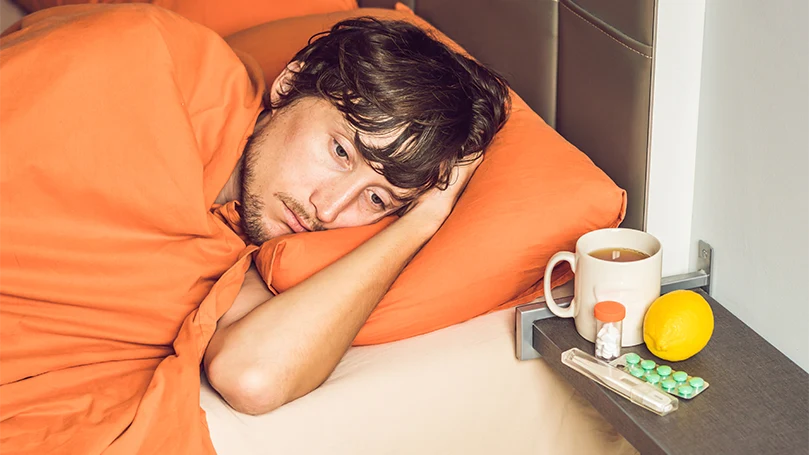
There are several reasons why blocked nose feels worse at night, and one of them certainly is feeling completely relaxed and therefore focused on a stuffed, runny nose. But, that's hardly all there is to it.
Increased blood flow when lying down
First up, when you're horizontal, your blood pressure changes and blood flow increases to your head and face. That can cause the blood vessels in your nose to “swell up” even more and make things a lot worse.
The reason your blood vessels need to swell up is to let your body fight off the infection that's causing the nasal congestion. In other words, they need to make room for white blood cells, proteins and other immune cells so they can do what they have to do.
And, as they expand, they also leave more room for fluids to accumulate, leading to additional swelling and inflammation of nasal passages, resulting in that annoying, stuffy feeling.
More mucus
Another reason your blocked nose is worse at night is that when you're lying down, mucus can't easily and effectively drain into your throat.
During the day when you're upright, gravity helps keep things in check. Your nose might be runny, but you can breathe a bit. Whereas, at night, when you're horizontal, there's nothing to stop the mucus from pooling in your nose and sinuses.
This can cause even more inflammation and swelling, which can, in turn, lead to a worsening of your symptoms.
Acid reflux
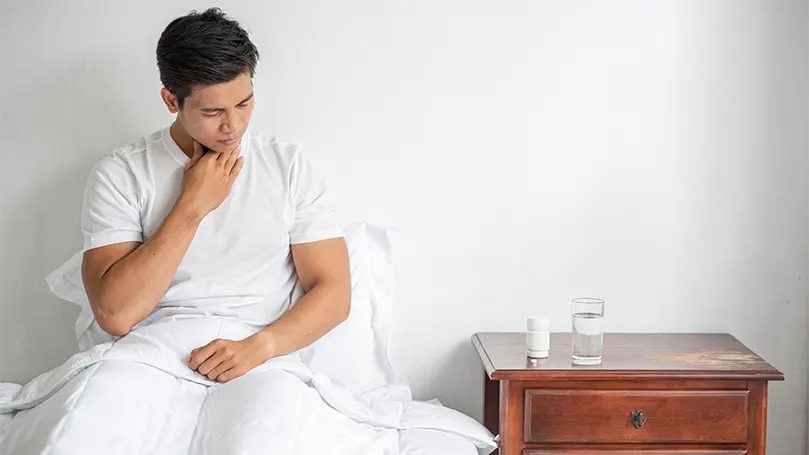
When you lie down, stomach acids can more easily travel up the oesophagus and into your throat and nose. This is called acid reflux and can cause a burning sensation, sore throat, sinus pain, as well as a stuffy, irritated nose.
If you have acid reflux, you may also experience heartburn, which is a pain or discomfort that radiates from the chest to the neck, jaw, or stomach, but that's a story for another time.
Sleeping position
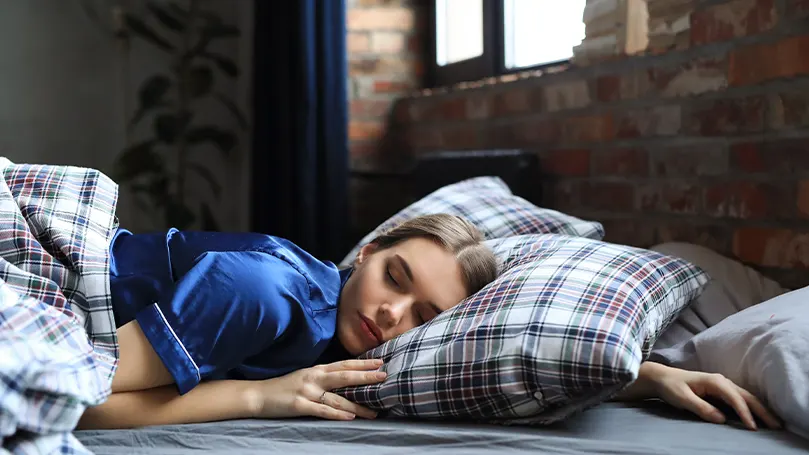
Finally, your sleep position may also be contributing to your blocked nose at night. If you sleep on your back, gravity can cause your tongue and soft palate to fall back and block your airway. And, as mentioned, gravity will also prevent proper drainage of your nasal passageways, leading to a heavily congested feeling.
All of this can lead to snoring and pauses in breathing (sleep apnea), which can make a good night's sleep downright impossible.
And, the worst thing about it is – this is a vicious circle. As a 10-year long study has concluded “Nasal symptoms increase the risk of snoring and snoring increases the risk of nasal symptoms”, so this one's kind of hard to get out of.
Do I need to fear a blocked, stuffy nose?
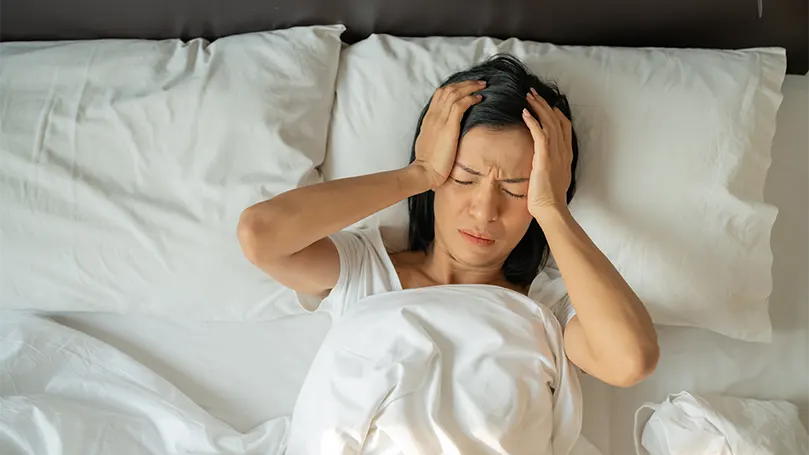
Now that we've gotten familiar with the reasons behind a blocked nose at night, it's time to ask the question on everyone's mind: is it dangerous to sleep with a blocked nose? The simple answer is no. There's no room for fear. A blocked nose, while painfully annoying, is not dangerous. However, if left unchecked, it can lead to some complications.
First and foremost, a stuffy nose can lead to dehydration. When you can't breathe properly through your nose – mouth breathing is bound to happen, which can dry out your throat and mouth.
Dehydration can lead to a whole host of problems, including headaches, fatigue, sore throat, and even constipation. So, it's important to make sure you're staying hydrated by drinking plenty of fluids, especially water when you're dealing with a stuffy nose.
A blocked nose can also make it difficult to get a good night's sleep, which can lead to fatigue and irritability. Additionally, if you have obstructive sleep apnea, a stuffy nose can worsen your symptoms and may even be dangerous.
If you snore loudly or frequently stop breathing during the night, it's important to see a doctor so they can rule test for sleep apnea and get you a CPAP machine if necessary.
Finally, a blocked nose can also lead to sinus infections (if it isn't already caused by one).
Namely, when mucus buildup prevents drainage, it provides the perfect environment for bacteria to grow.
If you have a fever, greenish or yellow discharge, or pain in your cheeks, teeth or jaw, it's important to see a doctor as you may have developed a sinus infection.
Will saline rinse help relieve nasal congestion?
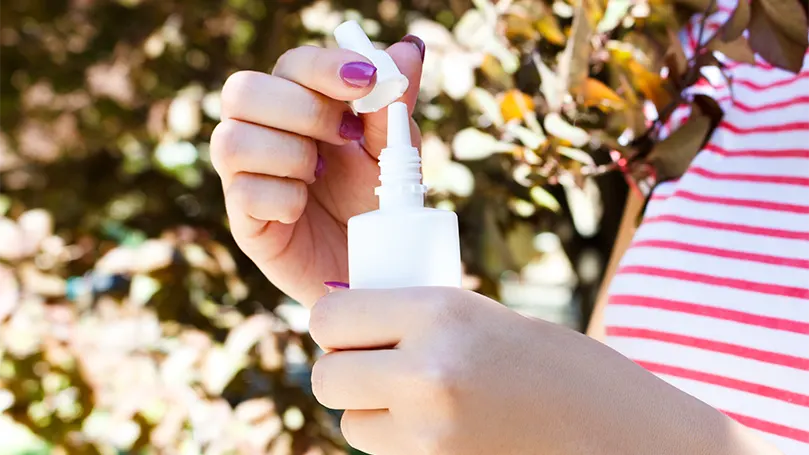
For a very long time, a saline rinse or a saltwater rinse was deemed the best way to quickly and effectively relieve nasal congestion. The idea behind it is that the saltwater will help to break up the mucus, making it easier to drain.
A saline rinse can be done using a Neti pot, which you can buy at most pharmacies (or online). Or, you can simply mix 1 teaspoon of salt with 1 cup of warm (distilled) water and use a bulb (or regular) syringe to rinse your nose.
One thing to note is – it's important to use distilled water (or boiled tap water) because regular tap water may contain harmful bacteria like Naegleria fowleri (check “House”, episodes Euphoria 1 and 2 to get acquainted with this amoeba) that can lead to serious infections. And, what's even more important is that you keep the Neti pot squeaky clean, since it can, too, become a breeding ground for harmful bacteria.
The bottom line, however, is that a saline rinse can provide some relief from a blocked nose, but it's not a cure-all.
Will corticosteroids help me?

Most decongestant nasal sprays contain a vasoconstrictor that shrinks the blood vessels in your nose, which reduces inflammation and swelling. Corticosteroids work in a similar way, but they're much more effective. So, yes – they will help.
Corticosteroids can be taken as a pill (usually prescribed for persistent cough symptoms), or they can be in a form of nasal spray. Nasal corticosteroid sprays like Beconase, Benocort, or Nasofan are available over the counter (OTC), and they provide almost instant relief.
They are most effective when used for a short period of time, no longer than five days. If you use them for too long, they can actually make your symptoms worse or cause additional issues.
Additionally, it's important to note that corticosteroid nasal sprays are not recommended for children under the age of four.
If you're looking for a corticosteroid that you can use for a longer period of time, you'll need to get a prescription from your doctor.
Should I take an antihistamine before sleep?
If your stuffy nose is caused by an allergic reaction to pollen, dust mites, or pet dander, an antihistamine can help to relieve your symptoms.
Antihistamines work by blocking the histamine that your body produces when it comes into contact with an allergen.
While they're not a cure, they can help to make your symptoms more bearable and they are available over the counter at most pharmacies.
Since there are many different types of antihistamines (pills, liquids, nasal sprays etc.), make sure to consult with a doctor or a pharmacist before buying and taking one.
Can essential oils help with a blocked nose?

While some swear by lavender and tea tree oils and their sleep-inducing properties, there are no scientific studies that have proven their effectiveness with nasal congestion.
And, even if they do work, it's only temporary. To top things off, using too much of some essential oils can actually irritate your nose and make your symptoms worse, so make sure you get yourself a good diffuser.
So, while they may provide some relief, essential oils are not a cure for a stuffy nose.
Is a humidifier recommended for blocked nasal passages?
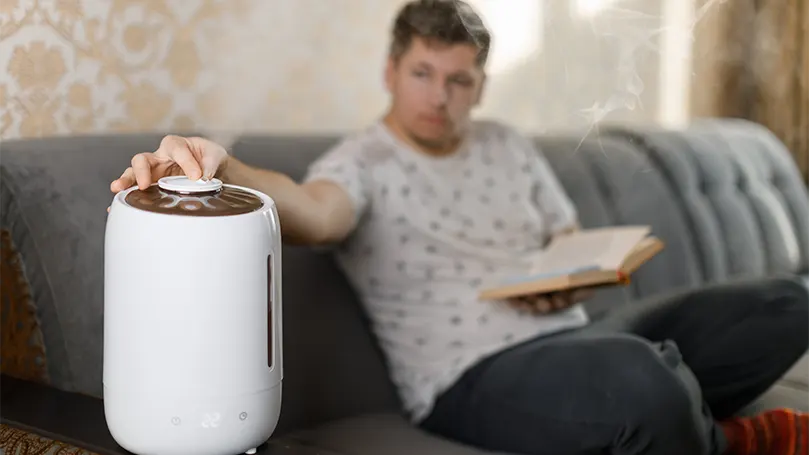
A humidifier can help to add moisture to the air, which in theory, can help to thin out hard nasal mucus and make it easier to drain. You may hear that someone has a constant blocked nose but no cold. On the same note, it could also help to relieve congestion caused by a cold or the flu. In any case – there is no big alarm until you notice blood in nose mucus.
Just like with essential oils, however, there is no scientific evidence that a humidifier can cure a stuffy nose. At the end of the day, while it might help to make some of your symptoms more tolerable, it probably won't make a major difference.
So – is it dangerous to sleep with a blocked nose?
In conclusion, while a congested nose can certainly be irritating – the answer to the question “is it dangerous to sleep with blocked nose” is NO. So, don't worry about it. Just relax and get some shut-eye. As you've seen, there are many things that you can do to relieve your symptoms. So, if you think “Why is my nose always blocked”, do know that there might be different reasons for this.
However, if your symptoms persist for more than a week, or if you have a fever, greenish or yellow discharge, or pain in your cheeks, sinuses, or teeth – go see a doctor. That's the best tip we can give you on how to unblock your nose.

















There are no comments yet
"*" indicates required fields